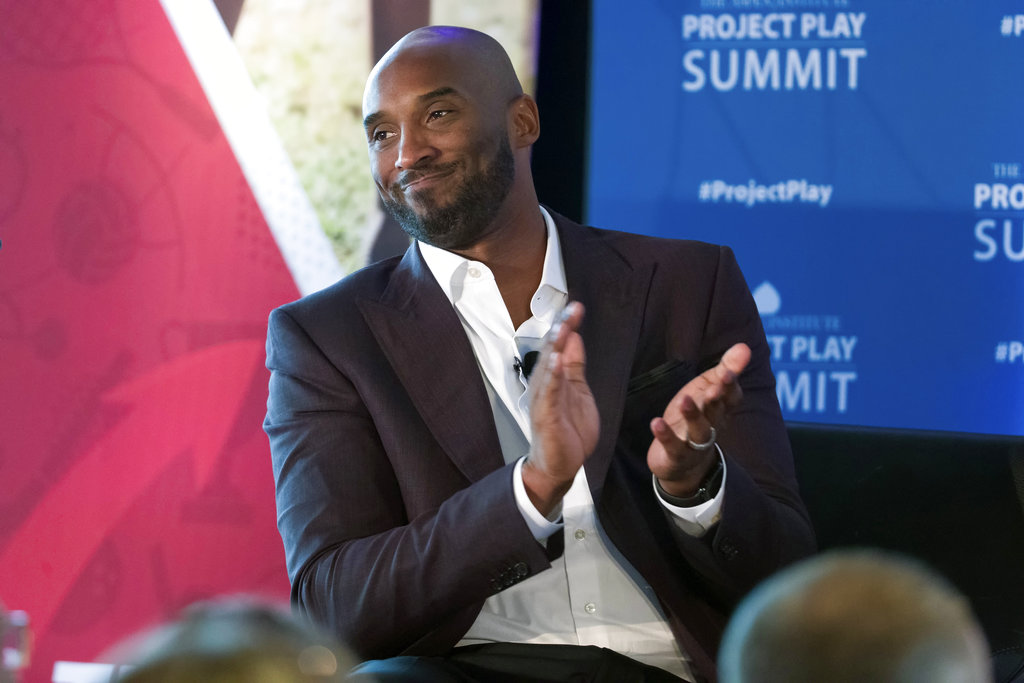
Former NBA basketball all-star Kobe Bryant reacts as he moderates a panel about youth sports during the Aspen Institute’s Project Play Summit, Tuesday, Oct. 16, 2018 in Washington. (AP Photo/Alex Brandon)
WASHINGTON — Call him Coach Kobe.
Kobe Bryant sounded just as passionate about coaching his daughter’s middle-school basketball team as he was about playing for the Los Angeles Lakers under Phil Jackson as he held court about his coaching philosophies and the state of youth sports on Tuesday.
Bryant was the headliner for the Aspen Institute’s annual summit on youth sports. The gathering was meant to foster discussion about how to improve youth sports in America and share data about participation rates, the health and development of child athletes and other trends.
Bryant said he was fortunate to have played for coaches who encourage players’ creativity rather than taking an autocratic approach.
“For adults, it’s important for us to get out of the way. Sometimes the most important thing to do is to just observe,” Bryant said. “You just watch and then you can guide.”
Bryant’s partnership with the Aspen Institute, a nonprofit that seeks to address global problems through gatherings of experts and intellectuals, is a natural outgrowth of his diverse post-basketball interests, which include filmmaking and a series of novels. Earlier this year he won an Oscar for “Dear Basketball,” an animated short film based on the open letter he wrote to announce his retirement from the NBA.
He referenced a conversation with fantasy novelist George R.R. Martin, whose books are the basis for “Game of Thrones,” in explaining his coaching philosophy. He said he asked Martin why the parents of his heroes always had to die. Martin’s response: “They either have to die or be a part of the problem.”
“It’s a terrible analogy, but bear with me,” Bryant said. “As parents of young athletes and coaches, if we are constantly providing the answer for them, they will not be able to problem-solve on their own. Give them the tools to go out and finish.”
The daylong event at the Newseum spotlighted persistent problems in American youth sports: Athletes specialize in a single sport too early, which can lead to burnout and hinder the development of diverse athletic skills; and organized sports can be inaccessible to low-income Americans because families have to pay for their kids to play.
By contrast, speakers at Tuesday’s forums included the former head of the Norwegian Olympic Committee and a top official with the French soccer federation, both of whom emphasized the importance of government funding that breaks down barriers to participation.
“It’s a right for all children and all youth in Norway to take part in sport,” said Inge Andersen, the Norwegian official. “It’s more or less free to participate in sport from when you are a little kid.”
It’s hard to argue with the recent results in those two countries: Norway, a nation of 5 million, led the world with 39 medals at the Pyeongchang Winter Olympics; and France won the World Cup while the United States, with more than four times the population, failed to qualify.
Bryant, too, was exposed to the European model of youth sports while spending much of his childhood in Italy. He said playing soccer helped him develop a better understanding of basketball’s complexities because it showed him how ball movement between two players can open an opportunity for a third.
Before he shared his thoughts on coaching, Bryant also hosted a panel with young athletes in which he asked them what they’ve learned from sports and how they cope with setbacks, including losses or injuries.
For coaches, he said a hands-off approach can have unexpected benefits.
“Sports has become very structured, which is also concerning,” he said. “We don’t have time to bring that imagination out. It’s a really big concern. In practice at least once a week, the first 20 minutes of practice, I have just imagination play.”